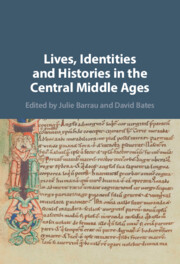Book contents
- Lives, Identities and Histories in the Central Middle Ages
- Lives, Identities and Histories in the Central Middle Ages
- Copyright page
- Contents
- Figures
- Contributors
- Abbreviations
- Introduction
- Part I Entwined Lives and Multiple Identities
- 1 Mother and Motherhood in the Vita et Passio Willelmi Norwicensis
- 2 Prayer for the Dead:
- 3 Authority over Men and the Allocation of Riches:
- 4 Flemish Settlement and Maritime Traffic in the South-West Peninsula of Britain, c. 1050–1250
- 5 Cistercians and the Laity in Twelfth- and Thirteenth-Century Upper Normandy
- 6 Memory and Trauma:
- 7 New Charters of the Empress Matilda, with Particular Reference to Her Reception at Gloucester in 1139
- 8 Female Identity before 1250:
- Part II Historians, Lawyers and Exegetes: Writing Lives and Identities
- Index
3 - Authority over Men and the Allocation of Riches:
Two Readings of William of Malmesbury
from Part I - Entwined Lives and Multiple Identities
Published online by Cambridge University Press: 24 September 2021
- Lives, Identities and Histories in the Central Middle Ages
- Lives, Identities and Histories in the Central Middle Ages
- Copyright page
- Contents
- Figures
- Contributors
- Abbreviations
- Introduction
- Part I Entwined Lives and Multiple Identities
- 1 Mother and Motherhood in the Vita et Passio Willelmi Norwicensis
- 2 Prayer for the Dead:
- 3 Authority over Men and the Allocation of Riches:
- 4 Flemish Settlement and Maritime Traffic in the South-West Peninsula of Britain, c. 1050–1250
- 5 Cistercians and the Laity in Twelfth- and Thirteenth-Century Upper Normandy
- 6 Memory and Trauma:
- 7 New Charters of the Empress Matilda, with Particular Reference to Her Reception at Gloucester in 1139
- 8 Female Identity before 1250:
- Part II Historians, Lawyers and Exegetes: Writing Lives and Identities
- Index
Summary
Anglo-Norman sources often ignore what we call the economy, or only make very quick allusions to it, thus leaving in the shadows the most dynamic moment of economic growth that this space has ever known. The narrative texts nevertheless make it possible to approach the representations that the clerics of the twelfth century had of the concrete problems of the satisfaction of needs and of the socially useful and morally virtuous use of natural wealth. The theme of hunger, common in the sources of the Rhenish regions, does not appear very frequently, and most often in connection with war. But the reading of texts by William of Malmesbury relating to the reign of William Rufus and the life of Bishop Wulfstan of Worcester also shows that the value of rulers, whether king or bishop, was measured by the subsistence of the inhabitants, especially the poorest. The question of the relationship between resources and needs, and more generally that of livelihood, thus appears to be a major political problem.
Keywords
- Type
- Chapter
- Information
- Publisher: Cambridge University PressPrint publication year: 2021

